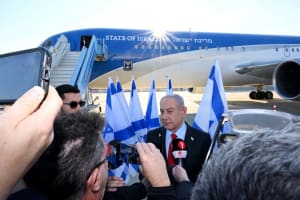Netanyahu arrives in US to 'redraw' the Middle East map, 'strengthen security & broaden the circle of peace'
Important issues include Gaza ceasefire extension and hostage release

Israeli Prime Minister Benjamin Netanyahu arrived in Washington D.C. for a high-stakes visit with U.S. President Donald Trump and his new administration to discuss a series of critical issues surrounding the Gaza War and regional diplomacy.
Before boarding the plane, Netanyahu said Israel’s actions in the war “already changed the face of the Middle East.”
“I believe that working closely with President Trump, we can redraw it even further and for the better. I believe that we can strengthen security, broaden the circle of peace and achieve a remarkable era of peace through strength.”
After a flight of 13 and a half hours, Netanyahu’s office said he was “welcomed at Blair House, the official and historic guest residence of the White House, by its director, who told him that this was Prime Minister Netanyahu’s 14th visit to Blair House – much more than any other foreign leader in its history since it was built in the 19th century.”
The most important part of the four-day visit will be the meeting with President Trump on Tuesday afternoon, Washington time. The pressing issue at the moment is the negotiations over the second stage of the ceasefire in Gaza, which are set to begin this week.
Trump told reporters on Monday that the “discussions on the Middle East with Israel and various and sundry other countries are progressing.”
Netanyahu had boasted about being the first foreign leader to be invited to the White House, calling it “a testimony to the strength of the Israeli-American alliance,” as well as “to the strength of our personal friendship.”
Netanyahu said he and Trump would talk about “Victory over Hamas, achieving the release of all our hostages and dealing with the Iranian terror axis in all its components – an axis that threatens the peace of Israel, the Middle East and the entire world.”
Under the terms of the ceasefire agreement, Israel and Hamas would start negotiations over the second phase 16 days after the start of phase one.
However, Israeli media reported that Netanyahu is considering not extending the ceasefire after 42 days of the first stage and plans to restart the war with the goal of fully destroying Hamas’ military and governmental capabilities, as he had vowed.
Netanyahu hopes to convince Trump to support him if he decides to restart the war, three Israeli officials told Axios.
Netanyahu’s upcoming meeting with Trump’s Middle East envoy Steve Witkoff on Monday will be the official start of the negotiations. Witkoff was instrumental in finalizing the ceasefire talks and just finished a visit to the Middle East.
On Saturday, the Prime Minister's Office (PMO) said Netanyahu and Witkoff would “discuss the Israeli positions” in the meeting.
However, “The real serious negotiations over phase two will only begin after Bibi meets Trump,” another senior Israeli official told Axios. “Nothing meaningful will happen before that.”
The PMO added, “Later in the week, Witkoff will speak with the Prime Minister of Qatar and senior Egyptian representatives. He will then discuss with the Prime Minister steps to advance the negotiations, including dates for the departure of delegations to the talks.”
Israeli media citing sources close to Witkoff said the envoy was deeply impacted by watching the Oct. 7 “atrocity film” during his visit to Israel and is committed to continuing the ceasefire until all hostages are released.
Several family members of current hostages, including Einav Tsangauker – one of the most outspoken critics of the government’s hostage deal policy – have also traveled to Washington, where some are scheduled to meet with Netanyahu.
If the ceasefire is extended to its second and third phases, it will mark the end of the war. This would shift the focus to the ongoing discussions about the “day after,” which received renewed attention last week after Trump suggested Egypt and Jordan take in Palestinians from Gaza while the enclave is being “cleaned out.”
Despite vocal opposition by Egyptian and Jordanian leaders, who were supported by a joint statement by Saudi Arabia, the United Arab Emirates, Qatar, the Palestinian Authority and the Arab League, Trump doubled down on his conviction that in the end, Egypt and Jordan would agree to receive Gazans.
After Trump spoke with Jordanian King Abdullah II on the phone last week, Jordan announced that the king had accepted an invitation for a personal meeting in the White House later this month.
After the meetings with Witkoff and Trump, Netanyahu will meet new Defense Secretary Pete Hegseth at the Pentagon on Wednesday, and House and Senate leaders on Thursday.
Israeli media also reported that Netanyahu plans to meet evangelical leaders, as well as the designated U.S. ambassador to Israel, Mike Huckabee.

The All Israel News Staff is a team of journalists in Israel.
You might also like to read this:
















